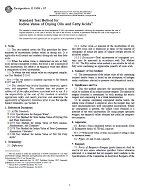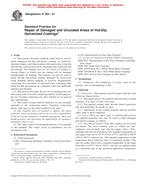1.1 This practice has been prepared for use by the designer, specifier, builder, and the installer of radiant barrier systems (RBS) for use in (multi- and single-family) residential building construction, not otherwise restricted from use. The scope is limited to instructions relative to the use and installation of RBS, including a surface(s) normally having an emittance of 0.1 or less, such as metallic foil or metallic foil deposits, mounted on substrates. Some examples that this practice is intended to address include: (1) low-emittance surfaces in vented building envelope cavities intended to retard radiant transfer across the airspace: (2) low-emittance surfaces at interior building surfaces intended to retard radiant transfer to, or from, building inhabitants; and (3) low-emittance surface at interior building surfaces intended to reduce radiant transfer to, or from, radiant heating or cooling systems.
1.2 This practice covers the installation process from pre-installation inspection through the post-installation procedure. It does not cover the production of the radiant barrier materials. (See Specification C1313.)
1.3 This practice is not intended to replace the manufacturer's installation instructions but shall be used in conjunction with such instructions. This practice is not intended to supercede local, state, federal, or international codes.
1.4 This practice assumes that the installer possesses a good working knowledge of the applicable codes and regulations, safety practices, tools, equipment, and methods necessary for installation of radiant barrier materials. It also assumes that the installer understands the fundamentals of residential building construction that affect the installation of RBS.
1.5 The values stated in inch-pound units are to be regarded as standard. The values given in parentheses are mathematical conversions to SI units that are provided for information only and are not considered standard.
1.6 This standard does not purport to address all of the safety concerns, if any, associated with its use. It is the responsibility of the user of this standard to establish appropriate safety and health practices and determine the applicability of regulatory limitations prior to use. For specific precautionary statements see Sections 5 and 7.
Product Details
- Published:
- 05/01/2012
- Number of Pages:
- 5
- File Size:
- 1 file , 140 KB
- Redline File Size:
- 2 files , 260 KB


